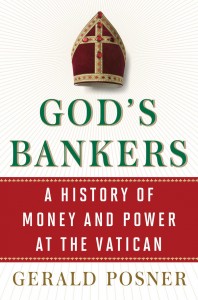Rules Are for Schmucks: A Review of God’s Bankers

The first 98 percent of Gerald Posner’s God’s Bankers, released last month, makes compelling reading. Then he drops the ball.
At bottom, religion is a business. People are willing to pay for psychological comfort, and history is replete with entrepreneurs of the divine who claim to provide it. Some truly believe that what they are selling has intrinsic value, others are deliberate frauds. Either way, money is the lifeblood of religion and always has been.
God’s Bankers is an economic history of one sect, the Roman Catholic Church. It unfortunately gives short shrift to the first millennium of church history as it rose to economic power, even though there is good research material on the earliest days of church finance available. The banking skills of third-century Pope Calixtus, for example, were critical to the church’s growth, long before Emperor Constantine and his successors helped engineer the massive theft of the accumulated wealth of hundreds of pagan temples for the church’s benefit.
Posner skips past all that and starts us in the Middle Ages, when one of the church’s principal revenue sources was the sale of indulgences. That scam, unfortunately, ultimately backfired by helping to set off the Protestant Reformation, putting the church on the receiving end of another massive theft. The resulting damage to the church’s economic power helped open the door for the Enlightenment, which nearly put the church out of business altogether by the start of the nineteenth century.
Posner’s tale begins to flourish in detail at that point, especially the prickly relations between the church and the Jewish bankers it repeatedly called on to bail itself out. Not even the Rothschilds, though, could save the church from the catastrophe of 1870, when the people of the lands in central Italy that the church ruled—and mercilessly taxed—chose to reject theocracy and join the rest of democratic Italy.
With its principal revenue source gone, the church’s influence steadily shriveled, until its greatest stroke of luck since the conversion of Constantine: the seizure of power in Italy by Benito Mussolini in 1922 and his decision to secure internal harmony by buying the church off rather than finishing it off. This resulted in the farcical recognition of the 108-acre garden plot of Vatican City as an independent “nation,” and in the extortion of the equivalent of over a billion dollars in today’s money from Italy’s taxpayers, to help fund what is now commonly called the “Vatican Bank.”
The combination of (1) a huge pile of money and (2) a complete absence of government regulation, based on the Vatican’s newly minted “sovereignty,” created some fascinating opportunities for skullduggery, which Posner lays out in lurid detail. He chronicles the bank’s involvement in everything from Mafia money laundering to munitions deals to counterfeiting plots to pyramid schemes that took down the whole Italian economy when they ultimately collapsed. World War II and the Holocaust were especially profitable, especially since Vatican-owned insurance companies made hundreds of millions from life insurance policies on Jews that they never honored. After the war, the money train seems to have kept on rolling, as Posner presents evidence that the Vatican was the final repository for untold quantities of Nazi and Ustaše gold, perhaps explaining why it was so undeniably active in arranging for the concealment of war criminals.
Nearly all of Posner’s story has been told before in bits and pieces, but he ties everything together in an impressive bundle of dreck. He recounts repeated regime changes at the Vatican, each promising reform that never quite materializes. Posner spent years assembling his research, confronted by implacable noncooperation from the Vatican at every turn. Until, that is, a new PR team was installed by Pope Francis in 2013, which among other things arranged for Posner to talk to officials charged with cleaning up the corruption. This attention seems to have gone to Posner’s head—he closes the book positively bubbly about all the wonderful changes underway, especially now that Cardinal George Pell is in charge of the money. You can read more about Pell’s low standards of morality here; Posner may perhaps have been embarrassed when, just a few days after his book launch, word leaked out from the Vatican about Pell’s mismanagement, including what appears to be diverting church money for his own personal use.
As even Posner acknowledges, Francis could have taken a different approach, which would have erased the problem permanently in one fell swoop. He could have chosen to handle the Vatican’s money the same way every other religion on the planet handles its money: by putting it in banks or other reputable institutions that are fully regulated by competent, neutral authorities. Instead, Francis chose to keep the same institutional structure that has been so riddled with abuse for nearly a century and simply announce that it will now be run by good men rather than bad men. (There’s little chance it will ever be run by women.) Maybe Francis is being pure-hearted about this— maybe Pell is, too. I doubt it, but I’m often wrong. But the overwhelming truth is that self-regulation of finance never works for any extended period of time, anywhere—the temptations for abuse are simply too great. There has to be full transparency and elaborate checks and balances. Posner drinks the Vatican’s Kool-Aid and misses this obvious conclusion, but the rest of us shouldn’t.
